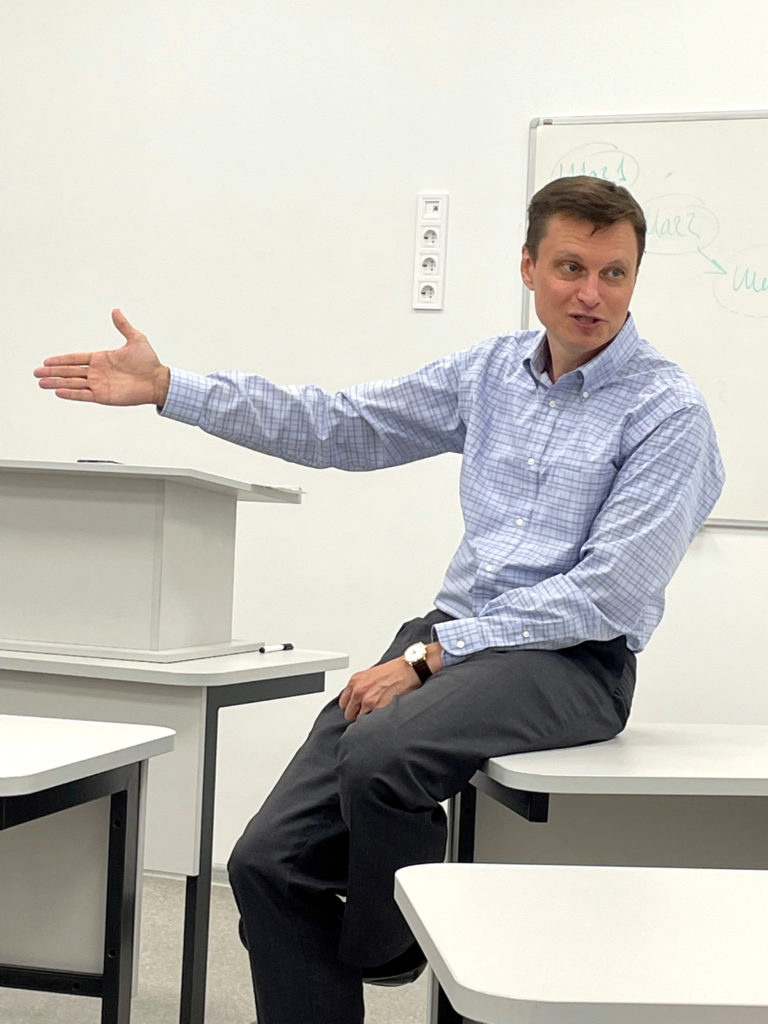
Pedestrians walk on the street in Kharkov, Ukraine. IMB Photo
Twenty-seven years ago, Mick and Dalese Stockwell left Texas and flew to the newly opened Eastern European country of Ukraine to plant churches. The former Soviet Republic was battered and bruised, having endured years of suppression by Communists, but the church remained viable, even robust. In 1991, when Ukraine declared its independence from the Soviet Union, the country had the second largest Baptist community in the world, second only to the U.S.
As Mick served alongside Ukrainian brothers, he saw their potential as a mission-sending force. Fifteen years ago, he helped them begin their fledgling Ukrainian Baptist Union Foreign Missions Department.

Mick and Dalese Stockwell have served in Europe for 27 years. They currently live in Prague, Czech Republic, but are still involved in catalyzing Ukrainians on mission.
This year, Mick and other International Mission Board leaders are meeting with Ukrainian Baptist Union leaders to establish six new mission training centers around the country. Initial meetings were so successful that IMB leaders from other regions of the world are also now seeing the potential for Ukrainians to help them reach the unreached in their part of the world.
Mick, IMB’s European globalization strategist, is celebrating seeing his vision become a reality.
“It’s like a mustard plant that was planted in the ground 15 years ago is now exploding,” Mick said. “The potential is huge. Ukrainians’ economic, political and geographical position gives them an advantage that we, as Americans, no longer have. Because of the investment and equipping IMB has given over last 30 years, they are now taking their place on the global stage as missionary equippers and senders.”
How the IMB invested and equipped
The Stockwells are just one example of Southern Baptists who have invested their lives in Ukraine.
A steady stream of missionaries has served faithfully over the past 30 years to plant churches, teach at seminaries and share Christ. Even this year, Ukraine was one of the first European countries to open post-COVID, allowing student teams to come. One family hosted three students in Ukraine’s capital last summer, in part to evangelize in the ethnically diverse region. Their city is a religious hub with more than ten mosques and one of the largest Hindu temples in Europe.
This international presence is one reason Ukraine has great potential for missionary activity and is a prime place to teach the importance of a global focus in missions. According to Mick, there are 80,000 international students in Ukraine each year, most from the parts of the world that are most resistant to the gospel. In addition to training Ukrainians to go abroad, IMB is helping Ukrainians develop a strategy to reach these students so they can take the message of hope to their own people.
Much of this training takes place in two seminaries that are heavily influenced by IMB personnel. Dan and Lori Upchurch helped start an evangelism and church planting degree program in Kiev decades ago that prepares pastors to minister in the Russian-speaking world. The program now has a Ukrainian director.
The Upchurches, along with Russell and Ingred Woodbridge, went on to help in a seminary in Lviv, Ukraine, which has seen phenomenal growth in the past few years. In 2013 they had 40 students; in 2019 they had nearly 800. This growth was partly due to the forced displacement of many due to the war with Russia in the Crimea region, but it was also due to “the addition of church planting, international missions and young leaders programs that train students to be biblical, missional and accountable leaders in the local church,” according to Preston Pearce, IMB’s theological education strategist for Europe.
Their current Ukrainian director is a Ph.D. graduate of Southwestern Baptist Theological Seminary. Missions has been deeply implanted in their DNA through the Southern Baptist model.

Joe Ragan spent 26 years serving with the IMB in Eastern Europe.
Another big influence in the Ukrainian missions movement is the late Joe Ragan. Ragan began serving in Ukraine in 1994 and ended his tenure in 2020 as he succumbed to cancer. He was pivotal to the current missions focus in Ukraine.
“No one loved Ukrainians more than Joe. He literally gave his life for the Lord and his ministry. Joe helped mobilize the first Ukrainian mission team, recruiting and sending college/seminary students from Ukraine on short-term mission trips to Kazakhstan starting around 2005. He also recruited a Ukrainian family to go to there in a partnership with Mississippi Baptists,” Mick said.
When Ragan died, part of his estate went to establish the six missionary training schools being started now across the country. And in his honor there is a giving project set up to continue work in Ukraine.
U.S. Southern Baptist churches have also sent volunteer groups, funded programs and provided funds for the new training school.
How IMB is partnering today
Today, IMB is helping launch new missionary training centers in Ukraine. This partnership is intended to develop Ukrainians as Global Missionary Partners (GMP). GMPs are cross-cultural missionaries who are affirmed and sent by a local church and sending entity in their home country. The GMPs are nurtured and affirmed by IMB personnel and work in cooperation with an IMB field team.
GMPs are being developed around the globe, not just in Ukraine.
“There are 140 Baptist conventions and unions around the world that our researchers have been able to locate,” IMB President Paul Chitwood said. “They are the fruit that remains from 175 years of work. We want to work with those partners and help them send their own missionaries.”
D. Ray Davis, IMB’s church mobilization manager, explains why developing GMPs is integral to IMB’s long-term mission strategies.

Ukrainian partner, Vitaly Sorokun, director of the Ukrainian Baptist Union’s Foreign Missions Department, will help IMB host an event in late November for all seminaries and training institutions across Ukraine that are equipping students for missions. This event will lay out how to become GMPs with IMB.
“Instead of U.S. churches sending internationals, we’ve recognized it is healthier, more sustainable and more appropriate for IMB and our churches to invest our 175 years of experience in assessment, sending-support structures, training and strategic areas into national partners,” Davis said. “We provide training and guidance to local churches and conventions overseas in helping them organize to send, but we also are expanding our overseas IMB teams to include global partners as team members.”
These partnerships help both parties, because the GMPs are not funded by IMB, but have access to IMB’s infrastructure of support — emotional care, resources for language learning and childhood education, logistical support, and practical help like finding housing and transportation.
“We can lend our robust support infrastructure to partner organizations until they develop the resources to provide these services for their workers. Training partner support personnel is part of the strategy to expand their capacity to send and support missionaries,” said Amanda Dimperio, director of globalization for the IMB.
IMB’s goal is to send 500 GMPs from across the globe to partner with our already existing missionary teams. In addition, IMB is helping to fuel the mission vision by taking Ukrainians on vision trips to see the need for Christ in far-to-reach places that are no longer accessible to us as North Americans. Ukrainians can help further the Matthew 28 mandate to take the gospel to the uttermost parts of the earth.
Pray
- Please pray for ongoing meetings with other Russian-speaking counties that take place this month to help in partnering together to cross-train, interact and mobilize believers from the former Soviet Union.
- Pray for IMB personnel as they take on the job of mentoring and discipling new missionaries from our partnering countries.
- Pray for meetings this month led by IMB and Ukrainian leadership as they present the GMP vision to seminaries and training institutions across Ukraine.

